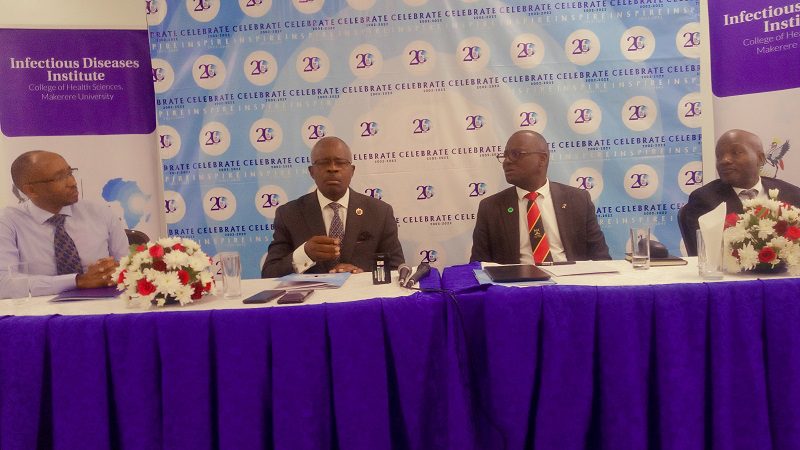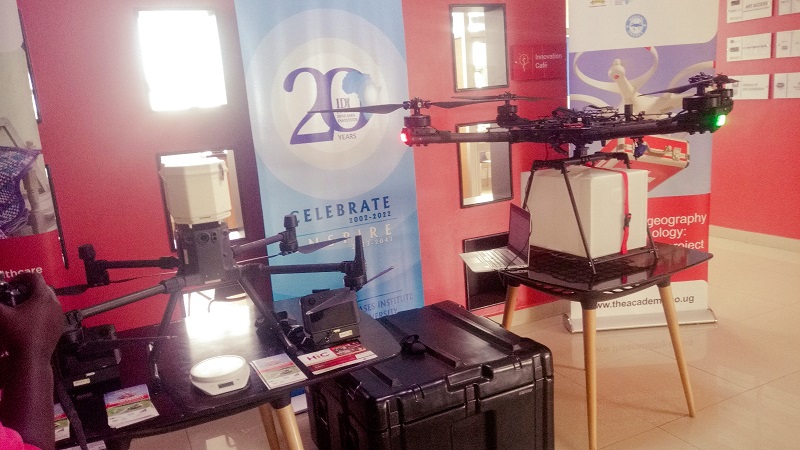
KAMPALA – The Infectious Diseases Institute (IDI) of Makerere University has embarked on celebrating its 20th anniversary with initial engagements between 20th and 24th March 2023.
Giving the background of the institute at a media briefing on Monday, Rev. Prof. Dr. Samuel Abimerech Luboga – IDI Board Chairman said that in September 2002, the Institute commenced clinical operations with support from the Academic Alliance for AIDS Prevention and Treatment in Africa.
He noted that over the years, IDI has evolved to become a leader in infectious diseases research and capacity development.
“IDI has established long-term partnerships with stakeholders in Uganda and beyond. The institution has extended its work through diverse programs, such as Prevention Care and Treatment, Research, Training, Laboratory services, Health System Strengthening, Global Health Security, and Health Innovations.”
Dr Andrew Kambugu, the Executive Director of IDI noted that they are currently support HIV care and treatment for 270,000 people living with HIV in 14 districts including Kampala and West Nile Region.
“This is approximately 20% of people living with HIV in Uganda. We have trained 54,000 health workers and health management staff from Uganda, 31 other African countries and eight countries outside Africa. IDI has also supported over 116 scholars in post-doctoral, PhD and masters study.”
“We are thrilled to be celebrating 20 years at IDI. This is a significant milestone in IDI’s history. We are exceptionally grateful to our partners, donors, and staff who have supported us throughout the years and we look forward to continuing this vital work to strengthen health systems in Africa,” he added.
Dr Kambugu says since their inception, they have dealt with both traditional infectious diseases, including malaria and HIV but also the emerging infectious diseases like Ebola, Marburg, Crimean Congo fever and many other exotic infections.
“We were started to address HIV. I am pleased to tell you that compared to when IDI started, the number of new HIV infection has dropped by more than half. This has been observed in Uganda, but it’s not limited to Uganda,” he noted.
On this, he noted that antiretroviral therapy is key in HIV prevention, revealing that “if somebody is exposed to them sexually, their chances of transmitting HIV to them are almost zero.”
Prof. Samuel called for much emphasis on infectious diseases compared to diseases of longevity, like cancers and other non-communicable diseases.
“We will all die but dying of infectious diseases is one way of premature death,” he said. “You are dying of things that are preventable and treatable and therefore, efforts like that of the infectious diseases Institute, has helped us to deal with this source of premature death.”

Dr. Aggrey Semeere – Physian Research Scientist said as institute, they support health systems strengthening around the country which helps to upgrade diagnostic capacity by equipping and supplying to various government hospitals and improve the facilities.
Going forward, Tom Kakaire, Head of Strategic Planning and Development at the Institute noted that in the coming years they want to target certain populations like vulnerable, underserved, and marginalized because of many socio economic variables.
“A lot of our programming we know that in HIV and in all other infectious diseases, marginalized populations and underserved and probably disadvantaged populations normally drive those diseases because they have less access to services sometimes they are discriminated against.”
“Sometimes they just don’t have the same means to access services and even to access information.”
He also says their focus will be on data collection, storage and dissemination.
“In whatever sector you are,….data is becoming the catch word for everybody and science is not any different. So a lot of the science, the capacity that we’re trying to build in the next five to 10 years will be around data.”
The experts revealed that they have also tapped into mobile solutions which they say has a lot of intersection with the data center because some of those technologies are data driven.
“That center is trying to find innovations which are appropriate for our setting, our low income setting that can make health delivery more efficient, that can make health outcomes better.”
Dr Kambugu says they have embarked on a strand of working around the continent. “Currently, we have at least one or two programs that take us to a total of about 15 countries in Africa. So we’ve started seriously thinking about that and it will play into how we organize ourselves and what kind of opportunities we pursue and what kind of capacities we build so that we can export some of our capacities and our lessons to the rest of the region.”





